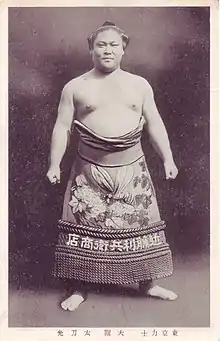Tachihikari Denemon
Tachihikari Denemon (Japanese: 太刀光 電右エ門, 29 March 1897 – 15 May 1952) was a Japanese professional sumo wrestler from Mikasa, Hokkaido. His highest rank was ōzeki. He was a member of the Tomozuna and Takasago stable. After retiring in 1927 he was an elder of the Japan Sumo Association under the name of Naruto (鳴戸).
| Tachihikari Denemon | |
|---|---|
| 太刀光 電右エ門 | |
 Postcard featuring Tachihikari | |
| Personal information | |
| Born | Masaharu Hatta 29 March 1897 Mikasa, Hokkaido |
| Died | 15 May 1952 (aged 55) |
| Height | 1.70 m (5 ft 7 in) |
| Weight | 113 kg (249 lb) |
| Career | |
| Stable | Tomozuna → Takasago |
| Record | 114-53-71-8 draws-6 holds |
| Debut | January 1913 |
| Highest rank | Ōzeki (May 1923) |
| Retired | October 1927 |
| Elder name | Naruto |
| Gold Stars | 1 (Ōnishiki) |
Career
He was born Masaharu Hatta (八田 政次) in Mikasa, Sorachi District, Hokkaido, the second son of a miner. In the summer of 1912 in Sapporo he met yokozuna Tachiyama, who recruited him to Tomozuna stable. He made his professional debut in January 1913. Despite his short height he was extremely flexible, able to throw his opponents with both his right hand grip and left hand grip. He was transferred to Takasago stable in May 1919 when his stablemaster Tachiyama (by then going by the elder name Azumazeki) abruptly quit the sumo world. He was diligent about training and reached the top makuuchi division in January 1921. In May 1922 he won his first (and only) kinboshi by defeating Ōnishiki Uichirō, who had not lost a bout in two years and had also defeated Tachiyama in the latter's last ever bout in January 1917. This in fact turned out to be Ōnishiki's last bout as well, as he quit sumo in the wake of the strike against the Tokyo Sumo Association known as the Mikawajima-Incident. Following this performance Tachihikari was promoted to sekiwake in January 1923 and to ōzeki in May 1923, ahead of the more favoured Kuragatake. He was the first ōzeki of the newly established Japan Sumo Association, formed from a merger of the Tokyo and Osaka associations. Although he did not win any championships at the ōzeki rank he continued to have good results until he hurt his right leg in a match against Dewagatake in May 1926. In the four tournaments following that injury he only took part in three bouts, and he finally retired in October 1927 having lost his ōzeki rank.
Retirement from sumo
He became a toshiyori or elder of the Japan Sumo Association under the name Naruto Oyakata, affiliated to Takasago stable. In 1937 he took part the kanreki dohyo-iri ceremony to mark Tachiyama's 60th birthday, in the role of sword-bearer. In May 1951 he quit the Sumo Association following disagreements with Takasago's stablemaster, ex-Maedayama, that saw him transfer briefly to Tatsunami stable. He returned to his hometown to start full-time operations of a restaurant that he had begun in Otaru. He died in May 1952 at the age of 55. His shikona was subsequently used by two other sekitori, Tachihikari Akihiro, a university graduate who was in jūryō in 1970, and Tachihikari Denemon II, a maegashira in the 1990s.
Career record
| - | Spring | Summer | ||||
|---|---|---|---|---|---|---|
| 1913 | (Maezumo) | West Jonokuchi #40 3–1–1hold |
||||
| 1914 | East Jonidan #63 2–3 |
East Jonidan #54 2–3 |
||||
| 1915 | East Jonidan #52 3–2 |
West Jonidan #15 3–2 |
||||
| 1916 | West Sandanme #63 3–1–1draw |
West Sandanme #32 3–1–1hold |
||||
| 1917 | East Makushita #56 3–1–1hold |
West Makushita #27 2–1 |
||||
| 1918 | West Makushita #18 4–1 |
East Jūryō #11 3–1 |
||||
| 1919 | West Jūryō #1 3–3–1hold |
East Jūryō #5 3–2 |
||||
| 1920 | East Jūryō #2 4–3 |
East Jūryō #2 6–2–1draw |
||||
| 1921 | East Maegashira #18 7–2–1 |
West Maegashira #6 4–5–1draw |
||||
| 1922 | West Maegashira #8 7–2–1draw |
East Maegashira #1 7–2–1draw |
||||
| 1923 | West Sekiwake 7–1–1–1draw |
East Ōzeki 7–1–2–1hold |
||||
| 1924 | East Ōzeki 0–0–10 |
West Ōzeki 7–1–2draws–1hold |
||||
| 1925 | West Ōzeki 3–2–6 |
East Ōzeki 7–4 |
||||
| 1926 | East Ōzeki 7–3–1 |
West Ōzeki 2–2–7 |
||||
| Record given as win-loss-absent Top Division Champion Top Division Runner-up Retired Lower Divisions Sanshō key: F=Fighting spirit; O=Outstanding performance; T=Technique Also shown: ★=Kinboshi; P=Playoff(s) | ||||||
| - | Spring Haru basho, Tokyo |
March Sangatsu basho, varied |
Summer Natsu basho, Tokyo |
October Jūgatsu basho, varied | ||
|---|---|---|---|---|---|---|
| 1927 | East Ōzeki #2 0–0–11 |
East Ōzeki #2 2–1–8 |
East Sekiwake 0–0–11 |
West Sekiwake Retired 0–0–11 |
||
| Record given as win-loss-absent Top Division Champion Top Division Runner-up Retired Lower Divisions Sanshō key: F=Fighting spirit; O=Outstanding performance; T=Technique Also shown: ★=Kinboshi; P=Playoff(s) | ||||||
See also
References
- "Tachihikari Denemon Rikishi Information". Sumo Reference. Retrieved 22 June 2020.